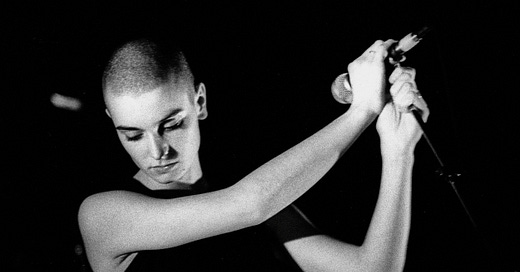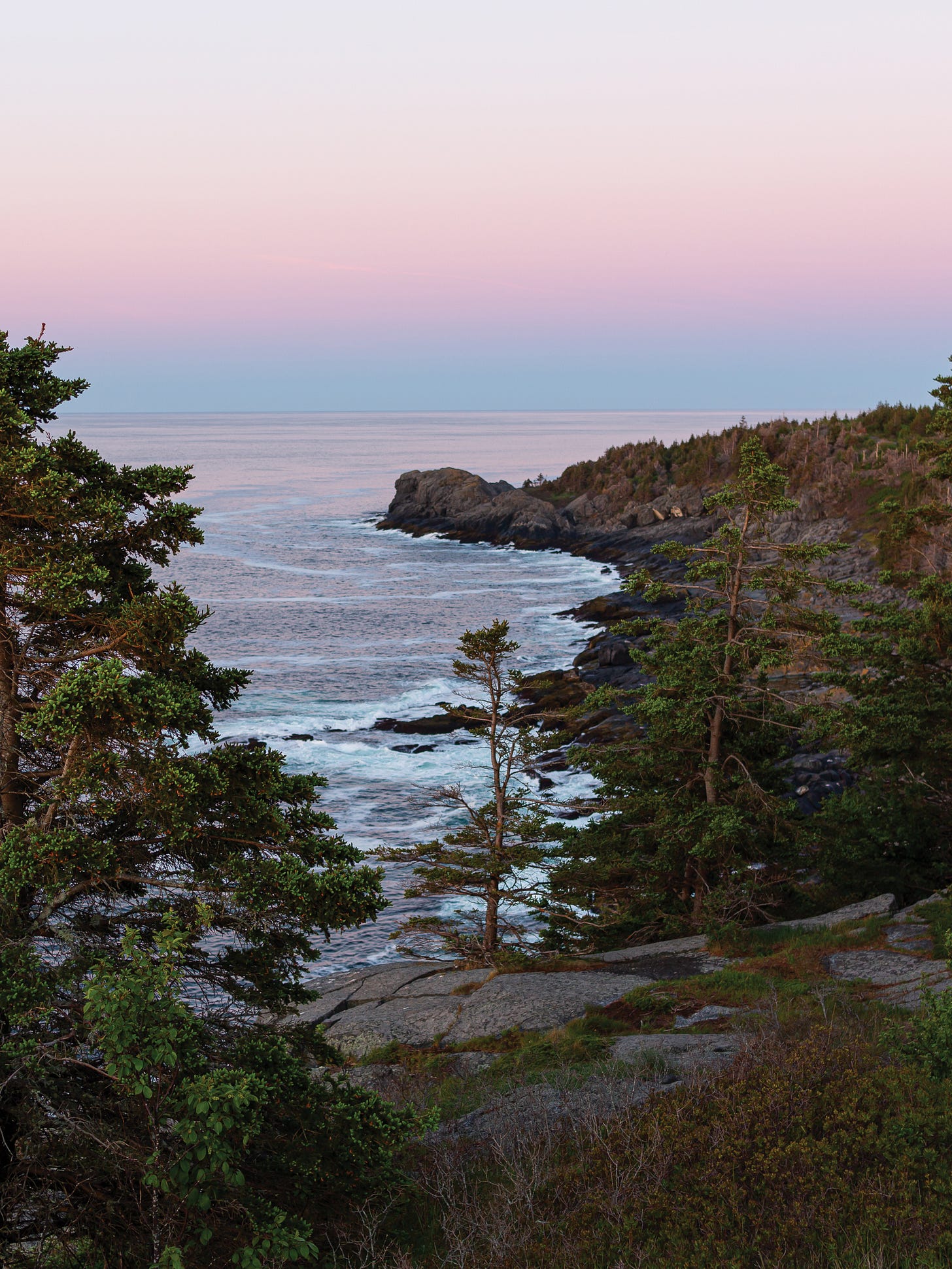Meeting midnight again, thanks motherhood.
Love for the Sinéad O'Connor doc, thinking of future nights
I finally watched Nothing Compares, the Sinéad O’Connor doc that came out just nine months before her death. I loved her music. I loved the way she balanced an ethereal sound with punk lyrics. It didn’t matter if she screamed or whispered a poem, she commanded rooms. She was cool in the purest form. Yet somehow her music was also accessible, relatable to people who weren’t necessarily from a torn Ireland or abusive parents. Watching the doc, it’s easy to feel angry that her anti-conformist attitude was capitalized on by the unmerciful pop music industry. But, she paved the way for so many incredible, rebellious artists since. It’s not that I think her strife was “worth it,” as optimists like to say regarding tragic figures (a whole other topic I’d love to dig into more later), but more that she turned her pain into something worthwhile. What do we do with the things that hurt us? Do we throw them away or can we recycle them into something meaningful?
One scene struck me deeply. O’Connor, who narrates the film, tells the viewer she loathes dusk. She doesn’t mind any other time of day, even the middle of the night. It’s that time when light fades into dark, that reminds her of a horrible time. For two weeks, her mother made her live in their garden. As a little girl, she would cry, watching the last light in the house go out by her mother’s hand, ignoring her pleas. How unfair, such an otherwise lovely time of day, to be stained by a person (a mother no less). How cruel that O’Connor would have to live the rest of her life encountering dusk once every 24 hours, and be reminded of all the emotions that are a result of that abandonment.
—
I became a mother again one month ago to a little one we’re calling Frances. The night I found out I was pregnant with her, we said goodbye to my mother. The night of my mom’s wake, in the town she raised us in, my sister made me pee on a stick and the news of my pregnancy was broken. Something about finding out about my maternal journey on the same night of my mother’s funeral halted something inside me. As if two versions of me could not coexist in one body: my pregnant self kicked out the grieving daughter. I put my sadness on hold so I could host this new little life with as much levity and love as I could muster. But now that Frances is earth-side, my brain has the space to stew on some memories I had previously swept under the rug. An unpacking job that has been left unfinished since last December.
And like Sinéad, I have a severe aversion to certain hours of the clock. I rarely met these hours (with sobriety at least), prior to becoming a mother, but as all parents know, a new, dark world unfurls between midnight and sunrise. The small hours are my dusk, my bedroom is the garden, and oh how I loathe when they collide.
My heart starts racing around 7pm and my throat gets tight. Part of this anxiety comes from knowing I have a parenting hurdle ahead: a sleepless night with painful latching and frantic burping. But I also fear staring into my dark bedroom, trying to make shadows feel friendly, trying to remember how the sunlight feels on my face. As a child, I used to freeze under my covers pretending to be asleep so my mom might not bother me. The only part of me I dared to move were my sleepy, heavy eyes, which stayed remarkably alert (perhaps some sort of survival tactic). I used to trace the outlines of the new bedroom furniture she bought for us in her new townhouse. All of it blue-hued from the streetlamp outside and foreign-looking. I still could paint every inch of that bedroom today.
Now, when I’m alone in my bedroom at night, trying to calm a fussy Frances, I hear my mom’s footsteps come closer to my bedroom and my whole body shakes with panic. Of course, I know she’s not there, but nausea sticks at the base of my tongue anyway. My memory replays from a catalog I unfortunately have stored in my mind, her faint weeping and yelling echoing in my head. With every drink, my mother’s light would dim, and a long black night awaited me. I can’t believe how close it all feels now that I’m awake during the night again.
It’s even worse when I look down at the little thing that brings me back into my slow-moving present. This tiny baby is, in a way, a quarter of my mother. Both of my girls resemble her, something I can barely cope with in the daylight. And now here I am, my life pulling a cyclical prank on me. As if to ask: “You thought you could just bury this?”
I’ve had the ease of avoiding the true witching hours for so long. It seems that now I have no choice but to meet my ghosts head-on, and tackle these unanswered feelings about motherhood, abandonment, and being worthy of love. Let the horrible questions pass through me: How can I make sure I don’t follow in my mom’s footsteps? Am I cut out for this? How could she leave us, when she must have at one point felt the same way I feel about my girls now? Or worse, what can change in a mother-daughter relationship to make either walk away from the other one permanently?
It’s generally easy to ditch the things in life that remind us of bad times. We can avoid tastes that once made us throw up, we can burn photographs, we can leave people, we can move out of our hometowns. But if our memories are connected to a time of day, those hours find you eventually. Can I heal my relationship with the dark? What would I find on the other side?
I found myself making a list of the beautiful things that have happened to me in the night. It helps reframe the current narrative I have stuck on a loop. It helps me remember that my days and nights ultimately belong to me, especially any that have yet to come. Sinéad knew this about her art, that even though her past was out of her hands, her future was hers to control. I want to get a poster of her for my wall. I really miss the way we used to keep our heroes in our bedrooms, cut out from magazines, and hung with a few push pins. Little reminders of the rebels that we want to be. Maybe then when my daughter is crying in the middle of the night, I’ll have a kind soul for company. I hope that before Sinéad passed, that she was able to reclaim dusk, she’s at the least inspired me to reclaim the night.
My list of beautiful nights:
It’s loud in my house, so I bundle up, grab a journal, and sneak out my back door. I find the path in our backyard that leads up the embankment to the graveyard and find a comfortable spot to sit. I write pages of a screenplay and sketch the stones around me. I think to myself — writing will always be there when I need it.
My friend Pete knocks on my college dorm door, waking up my roommate and me. He whispers, “Put on your snowsuits and come outside.” When we step into the hall, a bunch of others are doing the same thing. When we get outside and look up, the sky is covered in bright green and purple northern lights. About twenty of us lay there in silence, dumbfounded. We had no idea there’d be a sound to the lights. We keep trying to speak, but we barely do. The faint crackling of solar wind is the only sound.
It’s 2:00 am, but the city is the busiest I’ve seen it. It’s Nuit Blanche in Toronto, and I’m managing a photo gallery on a rammed Queen Street West. My friend is DJing soul and hip hop. Strangers and friends come by the tiny space for a dance and a drink, and then go get lost in the city’s exhibitions. I think I’ve just made a sale on a Pink Floyd print. I sneak outside the back alley to have a cigarette and eavesdrop on the crowds passing by.
We clip our headlamps on since it’s still pitch black outside and hike through the Monhegan cliff trail. It’s the first time I’m away from my daughter, and initially, I curse my friend who has made me get up at my usual waking hour. But then we arrive at the cliff’s edge and see a bolt of orange light up the horizon. The dark gives way to amber, then a bright yellow glow lights up the ocean. My friend tells me to turn around and a cotton-candy sky illuminates the untouched coast.






I hope the nights become gentler and gentler, and your cup fills with more beautiful memories. And I hope it brings you some comfort that if you're asking these questions about how you can break the cycle of abandonment, you're already on the right path. <3
I love your writing, and particularly this piece. So perceptive, poignant (for me), and prescient. You are brave, doing this work now.